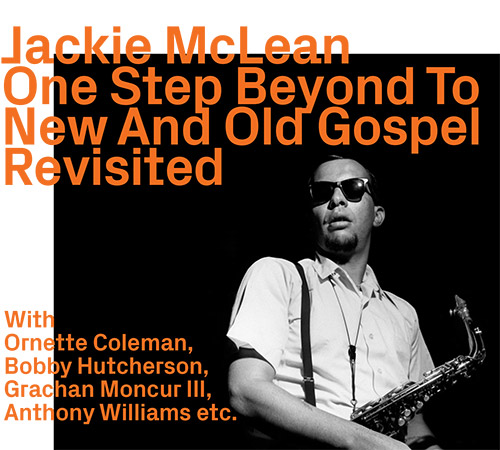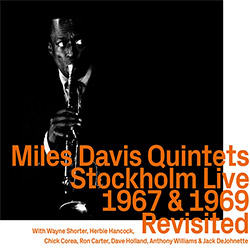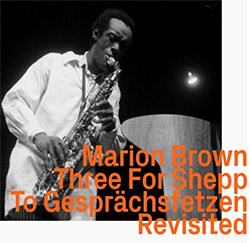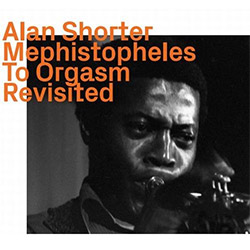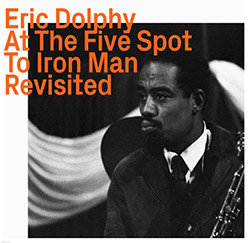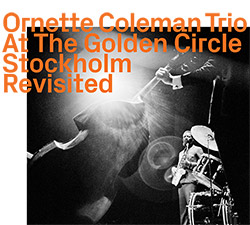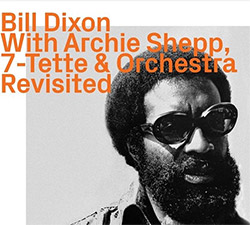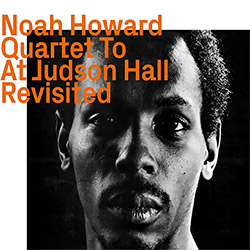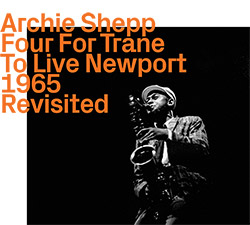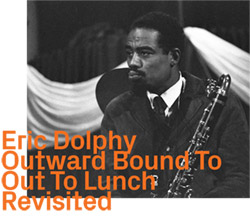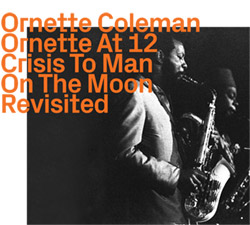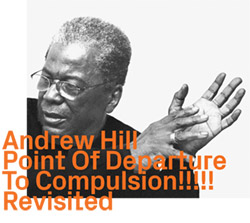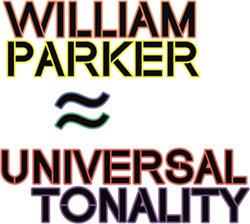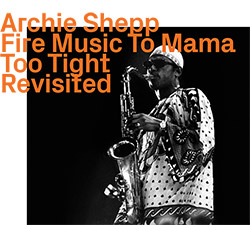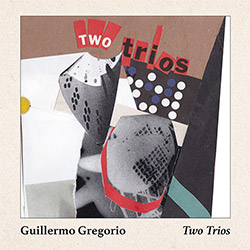
Pushed on by new approaches to jazz as the be-bop era ended, alto saxophonist and composer Jackie McLean assembled a new quintet including soon-to-be Miles drummer Tony Williams to record One Step Beyond, here remastered and matched with his 1967 quintet album New and Old Gospel that included Ornette Coleman on trumpet and Coleman drummer Billy Higgins; two exceptional albums "revisited".
In Stock
Quantity in Basket: None
Log In to use our Wish List
Shipping Weight: 2.00 units
Sample The Album:
Jackie McLean-alto saxophone
Grachan Moncur III-trombone
Bobby Hutcherson-vibraphone
Eddie Khan-double bass
Tony Williams-drums
Ornette Coleman-trumpet
LaMont Johnson-piano
Scotty Holt-double bass
Billy Higgins-drums
Click an artist name above to see in-stock items for that artist.
UPC: 752156116127
Label: ezz-thetics by Hat Hut Records Ltd
Catalog ID: ezz-thetics 1161
Squidco Product Code: 34026
Format: CD
Condition: New
Released: 2023
Country: Switzerland
Packaging: Cardboard Gatefold
Recorded at Van Gelder Studio, in Englewood Cliffs, New Jersey, on April 30th, 1963, and March 24th, 1967.One Step Beyond originally issued in 1964 as a vinyl LP on the Blue Note label with catalog code BST 841387.
New And Old Gospel originally issued in 1967 as a vinyl LP on the Blue Note label with catalog code BST 4262.
"One Step Beyond is rightly seen as a pivot point in Jackie McLean's evolution, but its adventurousness was not without precedent. As A.B. Spellman noted in Four Lives in the Bebop Business, "Quadrangle" - the opening track for 1959's Jackie's Bag; it was first recorded as "Inding" for Lights Out!, a 1956 Prestige date - "involved an elaborate group construction that [McLean] was afraid was too far-out," so he used "I Got Rhythm" changes to mainstream it, which he later regretted. His decision may have been related to the revocation of his cabaret card, making him more reliant on commercially successful albums to make ends meet.
By late 1961, McLean was more confident in stretching his music beyond the parameters of hard bop he helped codify, fortified by a two-month stand at Chat Qui Peche in Paris, where he befriended painter Bob Thompson. This is reflected in the second Blue Note album he recorded upon his return, Let Freedom Ring, recorded in March 1962. Spellman opined that the album was "a decided break with his past." Although it features an early foray into modal composition and startling upper-register screams in his solos, it is not an altogether clean break, as McLean also included an original 12-bar blues and "I'll Keep Loving You," penned by his early mentor, Bud Powell.
By the end of 1962, McLean was feeling the undertow of the new wave in jazz and the need to form his first working band since 1958. The first two pieces of the puzzle McLean put together were Grachan Moncur III, who had woodshedded with him earlier that year, and Tony Williams, the 17-year-old phenom who was part of a Boston rhythm section McLean gigged with in December (with his mother's permission, the drummer moved in with McLean's family at Christmas, so that he could dive into the New York scene). With less than a week before a stand at the Coronet in Brooklyn, McLean brought on Bobby Hutcherson and Eddie Khan, rounding out the quintet heard on One Step Beyond.
The inevitability of McLean distilling aspects of the new jazz is reflected in the opening pronouncement of his liner notes: "ONE step beyond is the direction by which creative man has been moving since time began." Perhaps unintentionally, his use of uppercase letters and italics emphasized his taking a single step, not a quantum leap. The idea that McLean was an incrementalist is supported by both his compositions and his solos. "Blue Rondo" is prototypical freebop, a repeated, tightly coiled figure that gives way to blues changes. While McLean's solo is teeming with his signature searing bluesiness, he occasionally colors outside the lines with against-the-grain phrasing and strong textures. "Saturday and Sunday" is a more decisive stride forward, as McLean uses contrasting melodies to represent joyful release and sober reflection. The unusual construction of minor-key chord changes also gives McLean the opportunity to push the envelope harder in his solo.
The evolution of established artists is often marked by their endorsement of, and collaboration with, promising newcomers. That is the case with McLean and his quintet, all of whom McLean enlisted when they were free from ironclad obligations: Moncur had just left Ray Charles; Hutcherson had weeks off from his steady gig with Al Grey and Billy Mitchell; Khan worked around his schedule with Max Roach; and Williams was literally in-house. In the case of Moncur, McLean devoted half of the album to the trombonist's compositions, which McLean discussed before his own in his liner notes. Both "Frankenstein" - a pithy name for a jazz waltz - and the evocative "Ghost Town" are further evidence of McLean's determination to move ahead. Weeks after recording the quintet's second outing for Blue Note - Destination ...Out! - McLean performed on Moncur's debut as a leader, Evolution, along with Hutcherson and Williams.
The threads of inevitability, endorsement, and incrementalism, would again entwine in 1967 with New And Old Gospel. Nat Hentoff's liner notes begin by quoting McLean about the inevitability of recording with Ornette Coleman, who, almost a decade after his first recordings, was still a polarizing force. Coleman's detractors were then refueled by the perceived naivety of his violin and trumpet playing, first documented in 1965, making the decision for him to play trumpet exclusively an even more ringing endorsement. However, the shock value of the teaming of McLean and Coleman obscured the significant next step McLean took as a composer.
The side-long "Lifeline" is arguably the most ambitious composition McLean wrote in his long, illustrious career. He partakes of some of the expansions of form and vocabulary then percolating in jazz - those represented by Coleman's thick textures and asymmetrical phrases being the most salient - without compromising the leathered joy and passion of his compositional voice. The four sections span the tornadic energy of "Offering" and the resignation of "The Inevitable End," which boldly concludes with the two horns alone, petering into silence. In between, the plaintive lyricism of "Midway" and the driving swing of "Vernzone" suggests that McLean's is not a straight line, but one with several changes of direction.
The contrasts of McLean's materials and their respective proximities to emergent jazz practices required a flexible rhythms section, one authentic in expressing both hard bop-steeped fundamentals and contemporary extensions. Lamont Johnson's stretching of McCoy Tyner's innovations predate Bobby Few's on Booker Ervin's The In Between by almost a year. Scotty Holt's prior work with Noah Howard gave him the insights to navigate the inside and outside passages of McLean's composition. Billy Higgins was simply the obvious choice for making the twain between McLean and Coleman meet. Their contributions to the jubilant "Old Gospel" and the probative "Strange As It Seems" give Coleman's music a fresh accessibility while upholding its tenets.
The evolution of Jackie McLean's music documented on One Step Beyond and New And Old Gospel continued through the solo concerts he gave in the runup to the millennium. He was, to use Anthony Braxton's term, a restructuralist, who first reengineered the bebop vocabulary, and then gleaned aspects of subsequent movements, always putting his indelible stamp on the resulting music. Each step along the way, he resolutely remained Jackie Mac."-Bill Shoemaker, June 2023
Artist Biographies
• Show Bio for Jackie McLean "John Lenwood "Jackie" McLean (May 17, 1931 - March 31, 2006) was an American jazz alto saxophonist, composer, bandleader, and educator, and is one of the few musicians to be elected to the DownBeat Hall of Fame in the year of their death. McLean was born in New York City. His father, John Sr., played guitar in Tiny Bradshaw's orchestra. After his father's death in 1939, Jackie's musical education was continued by his godfather, his record-store-owning stepfather, and several noted teachers. He also received informal tutoring from neighbors Thelonious Monk, Bud Powell, and Charlie Parker. During high school McLean played in a band with Kenny Drew, Sonny Rollins, and Andy Kirk, Jr. (the saxophonist son of Andy Kirk). Along with Rollins, McLean played on Miles Davis' Dig album, when he was 20 years old. As a young man he also recorded with Gene Ammons, Charles Mingus (for Pithecanthropus Erectus), George Wallington, and as a member of Art Blakey's Jazz Messengers. McLean joined Blakey after reportedly being punched by Mingus. Fearing for his life, McLean pulled out a knife and contemplated using it against Mingus in self-defense, but later stated that he was grateful that he had not stabbed the bassist. McLean's early recordings as leader were in the hard bop school. He later became an exponent of modal jazz without abandoning his foundation in hard bop. Throughout his career he was known for a distinctive tone, akin to the tenor saxophone and often described with such adjectives as "bitter-sweet", "piercing", or "searing", a slightly sharp pitch, and a strong foundation in the blues. McLean was a heroin addict throughout his early career, and the resulting loss of his New York City cabaret card forced him to undertake a large number of recording dates to earn income in the absence of nightclub performance opportunities. Consequently, he produced an extensive body of recorded work in the 1950s and 1960s. He was under contract with Blue Note Records from 1959 to 1967, having previously recorded for Prestige. Blue Note offered better pay and more artistic control than other labels, and his work for this organization is highly regarded and includes leadership and sideman dates with a wide range of musicians, including Donald Byrd, Sonny Clark, Lee Morgan, Ornette Coleman, Dexter Gordon, Freddie Redd, Billy Higgins, Freddie Hubbard, Grachan Moncur III, Bobby Hutcherson, Mal Waldron, Tina Brooks and many others. In 1962, he recorded Let Freedom Ring for Blue Note. This album was the culmination of attempts he had made over the years to deal with harmonic problems in jazz, incorporating ideas from the free jazz developments of Ornette Coleman and the "new breed" which inspired his blending of hard bop with the "new thing": "the search is on, Let Freedom Ring". Let Freedom Ring began a period in which he performed with avant-garde jazz musicians rather than the veteran hard bop performers he had been playing with previously. His adaptation of modal jazz and free jazz innovations to his vision of hard bop made his recordings from 1962 on distinctive. McLean recorded with dozens of musicians and had a gift for spotting talent. Saxophonist Tina Brooks, trumpeter Charles Tolliver, pianist Larry Willis, trumpeter Bill Hardman, and tubist Ray Draper were among those who benefited from McLean's support in the 1950s and 1960s. Drummers such as Tony Williams, Jack DeJohnette, Lenny White, Michael Carvin, and Carl Allen gained important early experience with McLean. In 1967, his recording contract, like those of many other progressive musicians, was terminated by Blue Note's new management. His opportunities to record promised so little pay that he abandoned recording as a way to earn a living, concentrating instead on touring. In 1968, he began teaching at The Hartt School of the University of Hartford. He later set up the university's African American Music Department (now the Jackie McLean Institute of Jazz) and its Bachelor of Music degree in Jazz Studies program. His Steeplechase recording New York Calling, made with his son René McLean, showed that by 1980 the assimilation of all influences was complete. In 1970, he and his wife, Dollie McLean, along with jazz bassist Paul (PB) Brown, founded the Artists Collective, Inc. of Hartford, an organization dedicated to preserving the art and culture of the African Diaspora. It provides educational programs and instruction in dance, theatre, music and visual arts. The membership of McLean's later bands were drawn from his students in Hartford, including Steve Davis and his son René, who is a jazz saxophonist and flautist as well as a jazz educator. Also in McLean's Hartford group was Mark Berman, the jazz pianist and broadway conductor of Smokey Joe's Cafe and Rent. In 1979 he reached No. 53 in the UK Singles Chart with "Doctor Jackyll and Mister Funk". This track, released on RCA as a 12" single, was an unusual sidestep for McLean to contribute towards the funk/disco revolution of the late 1970s. Many people, at the time, in the clubs where it was played confused the female singers on the track with his name thinking he was actually female. He received an American Jazz Masters fellowship from the National Endowment for the Arts in 2001 and numerous other national and international awards. McLean was the only American jazz musician to found a department of studies at a university and a community-based organization almost simultaneously. Each has existed for over three decades. McLean died on March 31, 2006, in Hartford, Connecticut after a long illness. In 2006, Jackie McLean was elected to the DownBeat Hall of Fame via the International Critics Poll. He is interred in Woodlawn Cemetery, The Bronx, New York City. A. B. Spellman's 1966 study, Black Music, Four Lives: Cecil Taylor, Ornette Coleman, Herbie Nichols, Jackie McLean, still in print, includes extensive mid-career reflections by McLean on his youth and career to date. Derek Ansell's full-length biography of McLean, Sugar Free Saxophone. details the story of his career and provides a full analysis of his music on record." ^ Hide Bio for Jackie McLean • Show Bio for Grachan Moncur III "Grachan Moncur III (born June 3, 1937) is an American jazz trombonist. He is the son of jazz bassist Grachan Moncur II and the nephew of jazz saxophonist Al Cooper. Born in New York City (his father's father was from the Bahamas) and raised in Newark, New Jersey, Grachan Moncur III began playing the cello at the age of nine, and switched to the trombone when he was 11. In high school he attended the Laurinburg Institute in North Carolina, the private school where Dizzy Gillespie had studied. While still at school he began sitting in with touring jazz musicians on their way through town, including Art Blakey and Jackie McLean, with whom he formed a lasting friendship. After high school Moncur toured with Ray Charles (1959–62), Art Farmer and Benny Golson's Jazztet (1962), and Sonny Rollins. He took part in two classic Jackie McLean albums in the early 1960s, One Step Beyond and Destination... Out!, to which he also contributed the bulk of compositions and which led to two influential albums of his own for Blue Note Records, Evolution (1963) with Jackie McLean and Lee Morgan, and Some Other Stuff (1964) with Herbie Hancock and Wayne Shorter. Moncur joined Archie Shepp's ensemble and recorded with other avant-garde players such as Marion Brown, Beaver Harris and Roswell Rudd (the other big name in American free jazz trombone). During a stay in Paris in the summer of 1969, he recorded two albums as a leader for the famous BYG Actuel label, New Africa and Aco Dei de Madrugada, as well as appearing as a sideman on numerous other releases of the label. In 1974, the Jazz Composer's Orchestra commissioned him to write Echoes of Prayer (1974), a jazz symphony featuring a full orchestra plus vocalists and jazz soloists. His sixth album as a leader, Shadows (1977) was released only in Japan. Unfortunately, he was subsequently plagued by health problems and copyright disputes and recorded only rarely. Through the 1980s he recorded with Cassandra Wilson (1985), played occasionally with the Paris Reunion Band and Frank Lowe, appeared on John Patton's Soul Connection (1983), but mostly concentrated on teaching. In 2004 he re-emerged with a new album (Exploration) on Capri Records featuring Grachan's compositions arranged by Mark Masters for an octet including Tim Hagans and Gary Bartz." ^ Hide Bio for Grachan Moncur III • Show Bio for Bobby Hutcherson "Bobby Hutcherson was born January 27, 1941, in Los Angeles. He studied piano with his aunt as a child, but didn't enjoy the formality of the training; still, he tinkered with it on his own, especially since his family was already connected to jazz: his brother was a high school friend of Dexter Gordon and his sister was a singer who later dated Eric Dolphy. Everything clicked for Hutcherson during his teen years when he heard a Milt Jackson record; he worked until he saved up enough money to buy his own set of vibes. He began studying with Dave Pike and playing local dances in a group led by his friend, bassist Herbie Lewis. After high school, Hutcherson parlayed his growing local reputation into gigs with Curtis Amy and Charles Lloyd and in 1960, he joined an ensemble co-led by Al Grey and Billy Mitchell. In 1961, the group was booked at New York's legendary Birdland club and Hutcherson wound up staying on the East Coast after word about his inventive four-mallet playing started to spread. Hutcherson was invited to jam with some of the best up-and-coming musicians in New York: hard boppers like Grant Green, Hank Mobley, and Herbie Hancock, but most importantly, forward-thinking experimentalists like Jackie McLean, Grachan Moncur III, Archie Shepp, Andrew Hill, and Eric Dolphy. Through those contacts, Hutcherson became an in-demand sideman at recording sessions, chiefly for Blue Note. Hutcherson had a coming-out party of sorts on McLean's seminal "new thing" classic One Step Beyond (1963), providing an unorthodox harmonic foundation in the piano-less quintet. His subsequent work with Dolphy was even more groundbreaking and his free-ringing, open chords and harmonically advanced solos were an important part of Dolphy's 1964 masterwork Out to Lunch. That year, he won the DownBeat readers' poll as Most Deserving of Wider Recognition on his instrument. Hutcherson's first shot as a leader came with 1965's Dialogue, a classic of modernist post-bop with a sextet featuring some of the hottest young talent on the scene - most notably Freddie Hubbard, Sam Rivers, and Andrew Hill, although drummer Joe Chambers would go on to become a fixture on Hutcherson's '60s records (and often contributed some of the freest pieces he recorded). A series of generally excellent sessions followed over the next few years, highlighted by 1965's classic Components (which showcased both the free and straight-ahead sides of Hutcherson's playing) and 1966's Stick-Up! In 1967, he returned to Los Angeles and started a quintet co-led by tenor saxophonist Harold Land, which made its recording debut the following year on Total Eclipse. Several more sessions followed (Spiral, Medina, Now) that positioned the quintet about halfway in between free bop and mainstream hard bop - advanced territory, but not entirely fashionable at the time. Thus, the group didn't really receive its due and dissolved in 1971. By that point, Hutcherson was beginning a brief flirtation with mainstream fusion, which produced 1970s funky but still sophisticated San Francisco (named after his new base of operations). By 1973, however, he'd abandoned that direction, returning to modal bop and forming a new quintet with trumpeter Woody Shaw that played at that summer's Montreux Jazz Festival (documented on Live at Montreux). In 1974, he re-teamed with Land and over the next few years, he continued to record cerebral bop dates for Blue Note despite being out of step with the label's more commercial direction. He finally departed in 1977 and signed with Columbia, where he recorded three albums from 1978-1979 (highlighted by Un Poco Loco). Adding the marimba to his repertoire, Hutcherson remained active throughout the '80s as both a sideman and leader, recording most often for Landmark in a modern-mainstream bop mode. He spent much of the '90s touring rather than leading sessions; in 1993, he teamed with McCoy Tyner for the duet album Manhattan Moods. Toward the end of the decade, Hutcherson signed on with Verve, for whom he debuted in 1999 with the well-received Skyline. In 2004, Hutcherson joined the San Francisco Jazz Collective, touring with the ensemble for several years. In 2007, he released the album For Sentimental Reasons, which featured pianist Renee Rosnes. Two years later, Hutcherson returned with the John Coltrane-inspired Wise One. The concert album, Somewhere in the Night, recorded at Dizzy's Club Coca-Cola at Lincoln Center, appeared in 2012. In 2014, Hutcherson joined organist Joey DeFrancesco and saxophonist David Sanborn for the Blue Note session Enjoy the View."-Steve Huey ^ Hide Bio for Bobby Hutcherson • Show Bio for Eddie Khan "Eddie Khan (1935 - 1985 or 1986) was an American jazz bassist who worked extensively with Max Roach, Eric Dolphy, Freddie Hubbard and Andrew Hill." ^ Hide Bio for Eddie Khan • Show Bio for Tony Williams "Anthony Tillmon Williams (December 12, 1945 – February 23, 1997) was an American jazz drummer. Williams first gained fame in the band of trumpeter Miles Davis and pioneered jazz fusion. He was inducted into the Modern Drummer Hall of Fame in 1986. During his lifetime, music critic Robert Christgau described Williams as "probably the best drummer in the world". Williams was born in Chicago and grew up in Boston. He was of African, Portuguese, and Chinese descent. He studied with drummer Alan Dawson at an early age, and began playing professionally at the age of 13 with saxophonist Sam Rivers. Saxophonist Jackie McLean hired Williams when he was 16. At 17 Williams gained attention by joining Miles Davis in what was later dubbed Davis's Second Great Quintet. Williams was a vital element of the group, called by Davis in his autobiography "the center that the group's sound revolved around." His playing helped redefine the role of the jazz rhythm section through the use of polyrhythms and metric modulation. Meanwhile, he recorded his first two albums as leader for Blue Note label, Life Time (1964) and Spring (1965). He also recorded as a sideman for the label including, in 1964, Out to Lunch! with Eric Dolphy and Point of Departure with Andrew Hill. In 1969, he formed a trio, the Tony Williams Lifetime, with John McLaughlin on guitar and Larry Young on organ. Lifetime was a pioneering band of the fusion movement. Their first album was Emergency!. After the departures of McLaughlin and bassist Jack Bruce, who had joined the group for its second album, and several more releases, Lifetime disbanded. In 1975, Williams put together a band he called "The New Tony Williams Lifetime", featuring bassist Tony Newton, pianist Alan Pasqua, and English guitarist Allan Holdsworth, which recorded two albums for Columbia Records, Believe It and Million Dollar Legs. In mid-1976, Williams was a part of a reunion with his colleagues from the Miles Davis band: keyboardist Herbie Hancock, bassist Ron Carter, and saxophonist Wayne Shorter. Davis was in the midst of a six-year hiatus and was "replaced" by Freddie Hubbard. The record was later released as V.S.O.P. The group toured and for several years and a series of live albums were released under the name "V.S.O.P." or "V.S.O.P.: The Quintet". In 1979, Williams, McLaughlin and bassist Jaco Pastorius united for a one-time performance at the Havana Jazz Festival. This trio came to be known as the Trio of Doom, and a recording of their performance (along with some studio tracks recorded in New York shortly thereafter) was released in 2007. It opens with a powerful drum improvisation by Williams, followed by McLaughlin's "Dark Prince" and Pastorius' "Continuum", Williams' original composition "Para Oriente" and McLaughlin's "Are You the One?" Williams and Pastorius had also played together on the Herbie Hancock track "Good Question" from his 1978 album Sunlight. With the group Fuse One, Williams released two albums in 1980 and 1982. In 1985, he returned to Blue Note and the result was a series of recordings for the label beginning with Foreign Intrigue, which featured the playing of pianist Mulgrew Miller and trumpeter Wallace Roney. Later that year he formed a quintet with Miller, Roney, saxophonist Bill Pierce, and bassist Charnett Moffett (later Ira Coleman). This band played Williams' compositions almost exclusively. Williams also played drums for the band Public Image Limited, fronted by John Lydon (a.k.a. Johnny Rotten of the Sex Pistols), on their release Album/Cassette/Compact Disc (1986, the album title varied depending on the format). He played on the songs "FFF", "Rise" (a modest hit), and "Home". Bass guitarist Bill Laswell co-wrote those three songs with Lydon. The other drummer on that album was Ginger Baker. Williams lived and taught in the San Francisco Bay Area until his death from a heart attack following routine gall bladder surgery. One of his final recordings was The Last Wave by the trio known as Arcana, a release organized by Bill Laswell." ^ Hide Bio for Tony Williams • Show Bio for Ornette Coleman "Randolph Denard Ornette Coleman (March 9, 1930 - June 11, 2015) was an American jazz saxophonist, violinist, trumpeter, and composer known as a principal founder of the free jazz genre, a term derived from his 1960 album Free Jazz: A Collective Improvisation. His pioneering performances often abandoned the chordal and harmony-based structure found in bebop, instead emphasizing a jarring and avant-garde approach to improvisation. Born in Fort Worth, Texas, Coleman began his musical career playing in local R&B and bebop groups, and eventually formed his own group in Los Angeles featuring members such as Ed Blackwell, Don Cherry, Charlie Haden, and Billy Higgins. In 1959, he released the controversial album The Shape of Jazz to Come and began a long residency at the Five Spot jazz club in New York City. His 1960 album Free Jazz would profoundly influence the direction of jazz in that decade. Beginning in the mid-1970s, Coleman formed the group Prime Time and explored funk and his concept of Harmolodic music. Coleman's "Broadway Blues" and "Lonely Woman" became genre standards and are cited as important early works in free jazz. His album Sound Grammar received the 2007 Pulitzer Prize for Music. AllMusic called him "one of the most important (and controversial) innovators of the jazz avant-garde"." ^ Hide Bio for Ornette Coleman • Show Bio for LaMont Johnson "LaMont Johnson (October 1, 1941 – October 21, 1999) was an American jazz pianist who played in the hard bop and post-bop genres. He recorded extensively with Jackie McLean during the 1960s as well as with Ornette Coleman, Kenny Burrell, Bud Shank, Paul Beaver, and Bernie Krause, among others. James LaMont Johnson was born in New York City, New York. During his childhood he took dancing, singing, and mime lessons, and appeared on the Star Time Kids television program at age 7. He later served in the United States Air Force in Germany, after which he attended Manhattan College and Syracuse University. Johnson began his recording career in 1962. In New York City, he worked with tubist Howard Johnson and trumpeter Woody Shaw as the bebop period came to an end. Throughout the 1960s, he recorded with artists such as Jackie McLean, Ornette Coleman, and George Benson. Later in the same decade, Johnson began composing music for films and advertisements. Johnson lived and worked in San Diego, California, where he established the record label MasterScores Records. Johnson worked in the film industry during the 1970s as a distributor and producer. He produced the 1973 martial arts film Thunderfist. Johnson was a major shareholder in the film distributors Artisan Releasing and Twin World Films, and formed another distributorship, Elmark General Film. In his later years, Johnson lived in Austin, Texas, where he continued to perform at venues such as Top of the Marc, and released I'll Be Home for Kwanzaa on the Bagel Label. During this time, he appeared on Jackie's Blues Bag by the Hip Bop Essence All Stars, a group that also included Branford Marsalis, Javon Jackson, and Vincent Herring. He also worked with Black Entertainment Television. Between 1991 and 1997, he was involved with more than 30 jazz festivals, as either a performer or producer. On October 21, 1999, Johnson died of heart failure in Austin, Texas, where he lived with his wife, Jayne Taylor Johnson. Johnson had two daughters, Astrid and Kyleigh, and two sons, Neil and Rand. At the time of his death, Johnson had indicated his plans to return to San Diego." ^ Hide Bio for LaMont Johnson • Show Bio for Scotty Holt "Scotty Holt is an American jazz bassist. He is known for his work with Jackie McLean for Blue Note Records in the 1960s, on albums such as New and Old Gospel and Hipnosis. He also performed in McLean's quartet, along with Billy Higgins and LaMont Johnson. An example of their work in concert is provided by the SteepleChase Records LP, Dr. Jackle. He also recorded with Woody Shaw, Bud Powell, and Ornette Coleman. He toured Europe with Art Blakey in 1969, and has not recorded since." ^ Hide Bio for Scotty Holt • Show Bio for Billy Higgins "As a member of the groundbreaking Ornette Coleman-led quartet that launched the free jazz renaissance, Billy Higgins remains one of the most important and controversial drummers in music history. An uncommonly versatile and intuitive player, his nimble rhythmic patterns achieved a perfect balance between function and form, inspiring the great trumpeter Lee Morgan to remark "Higgins] never overplays, but you always know he's there." Born October 11, 1936, in Los Angeles, Higgins began his career playing R&B, supporting headliners including Bo Diddley, Amos Milburn, and Jimmy Witherspoon. In 1953 he joined high school friend and trumpeter Don Cherry in the Jazz Messiahs, a group also featuring saxophonist James Clay; three years later, he began his session career, in the months to follow appearing on recording dates led by saxophonist Lucky Thompson and bassist Red Mitchell. Around this time, Higgins and Cherry met Coleman through mutual friend Clay. A virtual unknown, the Texas-born saxophonist was supporting himself with menial jobs while working diligently to hone a musical lexicon liberated from the restraints of conventional harmonic, melodic, and rhythmic structures. Both Higgins and Cherry soon joined Coleman's rehearsal group, which spent years woodshedding before finally securing its first live gigs in 1958, opening for Paul Bley at L.A.'s Hilcrest Club. Audiences were either angered or simply baffled by Coleman's radical sensibility, which he later dubbed "harmolodics," and with the 1958 release of his debut LP, Something Else!!!! The Music of Ornette Coleman, the controversy spread throughout the jazz populace, dividing musicians, critics, and fans alike. Higgins followed Coleman when he relocated the group to New York City in 1959 to begin a residency at the Five Spot Café. Love it or hate it, their music was the talk of the town, and with the addition of new bassist Charlie Haden, Coleman finally began to make concrete the sounds and structures he'd pursued for years. His 1959 Atlantic Records debut, The Shape of Jazz to Come, remains a watershed album by any definition and a schism-creating turning point in the history of the avant-garde. The accolades now heaped on Coleman also launched his collaborators to prominence, and Higgins soon emerged as one of the most sought-after drummers in contemporary jazz, proving a master of both the hard bop sensibility still dominant throughout the jazz community as well as the more fluid and abstract approach of the new generation. When a 1961 drug bust stripped Higgins of his cabaret card, prompting his exit from Coleman's band, he focused on studio work, becoming the unofficial house drummer at Blue Note Records during the label's creative zenith. In the decade to come, Higgins appeared on seminal dates including Dexter Gordon's Go!, Jackie McLean's A Fickle Sonance, and Lee Morgan's The Sidewinder, proving time and again his consummate skill and flexibility; even after Liberty Records acquired Blue Note in 1967, he remained much in-demand, maintaining his position as the premier drummer of the avant-garde with contributions to landmark efforts including Archie Shepp's 1971 LP Attica Blues and Coleman's comeback effort, Science Fiction. Higgins was also a frequent collaborator of pianist Cedar Walton, and with bassist Bill Lee and trumpeter Bill Hardman led the big-band ensemble the Brass Company for several years during the early '70s. After close to two decades on tour and in New York, Higgins settled back in Los Angeles in 1978. The following year he recorded his first-ever session as a leader, the Red label LP Soweto. Higgins recorded a few more headlining sessions in the years to follow but seemed to value most his role as a sideman, supporting saxophonist Joe Henderson and trombonist Slide Hampton during the first half of the 1980s. After appearing behind star and longtime collaborator Dexter Gordon in filmmaker Bertrand Tavernier's 1986 love letter to jazz, 'Round Midnight, Higgins reunited with Coleman, Cherry, and Haden for a 1987 tour that culminated in a new studio album, In All Languages. The following year Higgins teamed with poet Kamau Daaood to found the World Stage, a storefront enclave that hosted creative workshops, community activities, and live performances. He regularly tapped his extensive professional network to lure many of the biggest names in jazz to the World Stage site both as performers and as tutors, and ultimately Higgins turned his attention to teaching in a formal setting as well, serving on the jazz faculty at UCLA. Higgins spent much of the remainder of his life battling liver disease, a manifestation of the hepatitis he contracted decades earlier. In March 1996, he underwent a liver transplant and when his body rejected the new organ, he was forced to submit to a second procedure just 24 hours later. Higgins nevertheless returned to music a few months later, traveling to New York to renew his collaboration with Coleman. However, by 2001 his new liver began to fail, and while waiting to find a donor, he succumbed to pneumonia on May 3. Higgins was just 64 years old at the time of his death."-Jason Ankeny, Blue Note Records ^ Hide Bio for Billy Higgins
4/26/2024
Have a better biography or biography source? Please Contact Us so that we can update this biography.
4/26/2024
Have a better biography or biography source? Please Contact Us so that we can update this biography.
4/26/2024
Have a better biography or biography source? Please Contact Us so that we can update this biography.
4/26/2024
Have a better biography or biography source? Please Contact Us so that we can update this biography.
4/26/2024
Have a better biography or biography source? Please Contact Us so that we can update this biography.
4/26/2024
Have a better biography or biography source? Please Contact Us so that we can update this biography.
4/26/2024
Have a better biography or biography source? Please Contact Us so that we can update this biography.
4/26/2024
Have a better biography or biography source? Please Contact Us so that we can update this biography.
4/26/2024
Have a better biography or biography source? Please Contact Us so that we can update this biography.
Track Listing:
1. Saturday And Sunday 10:29
2. Frankenstein 7:29
3. Blue Rondo 4:50
4. Ghost Town 14:3
5. Lifeline 21:39
6. Old Gospel 10:43
7. Strange As It Seams 9:12
Hat Art
Improvised Music
Jazz
Melodic and Lyrical Jazz
Jazz Reissues
NY Downtown & Metropolitan Jazz/Improv
Quintet Recordings
Staff Picks & Recommended Items
New in Improvised Music
Search for other titles on the label:
ezz-thetics by Hat Hut Records Ltd.


